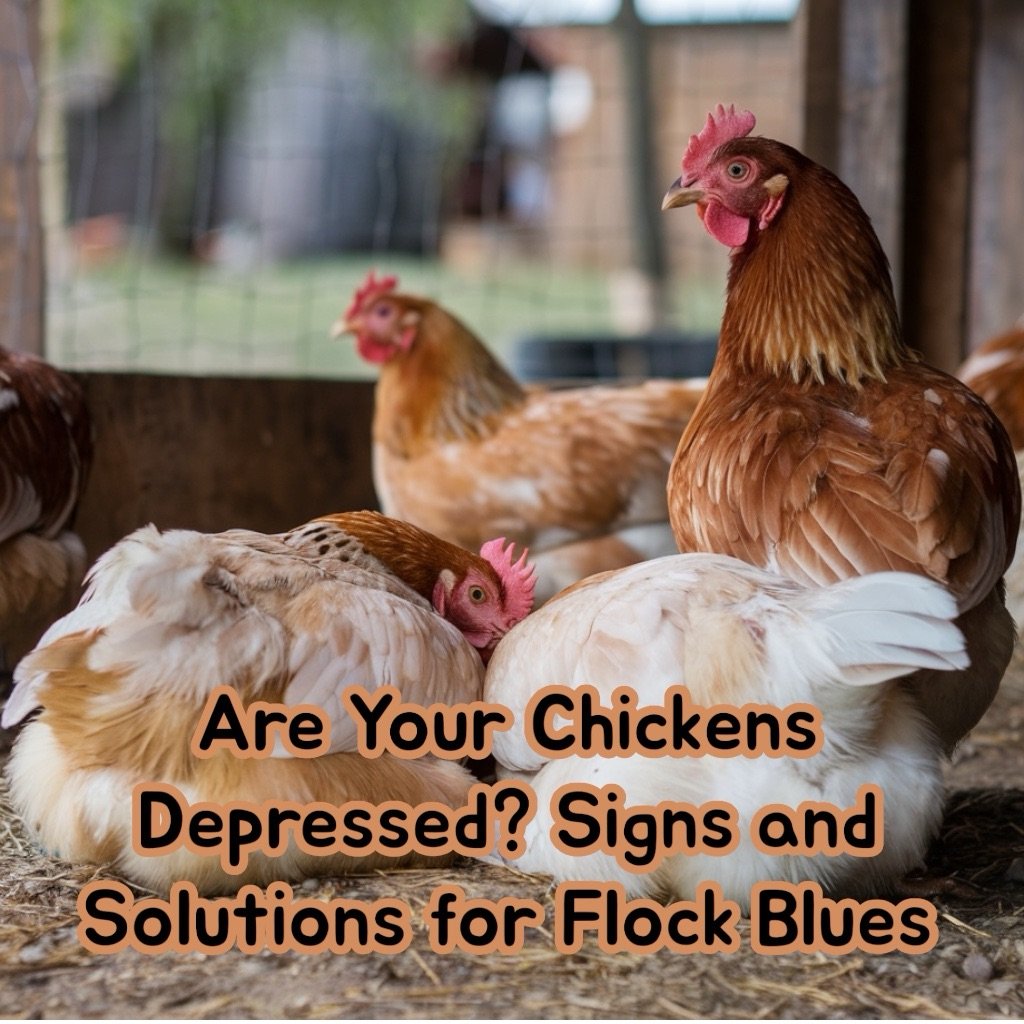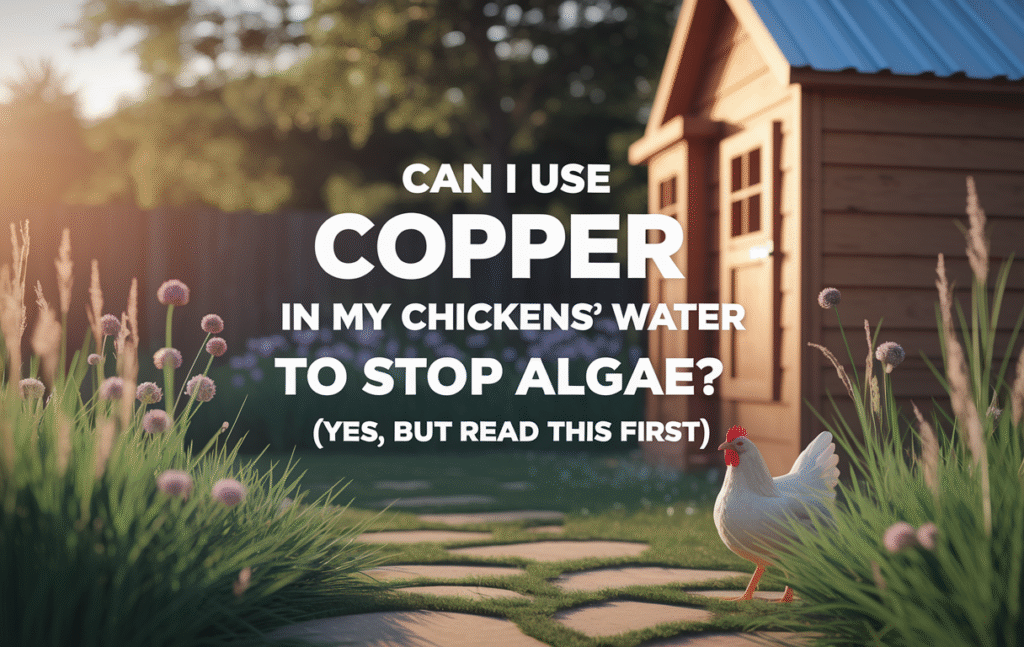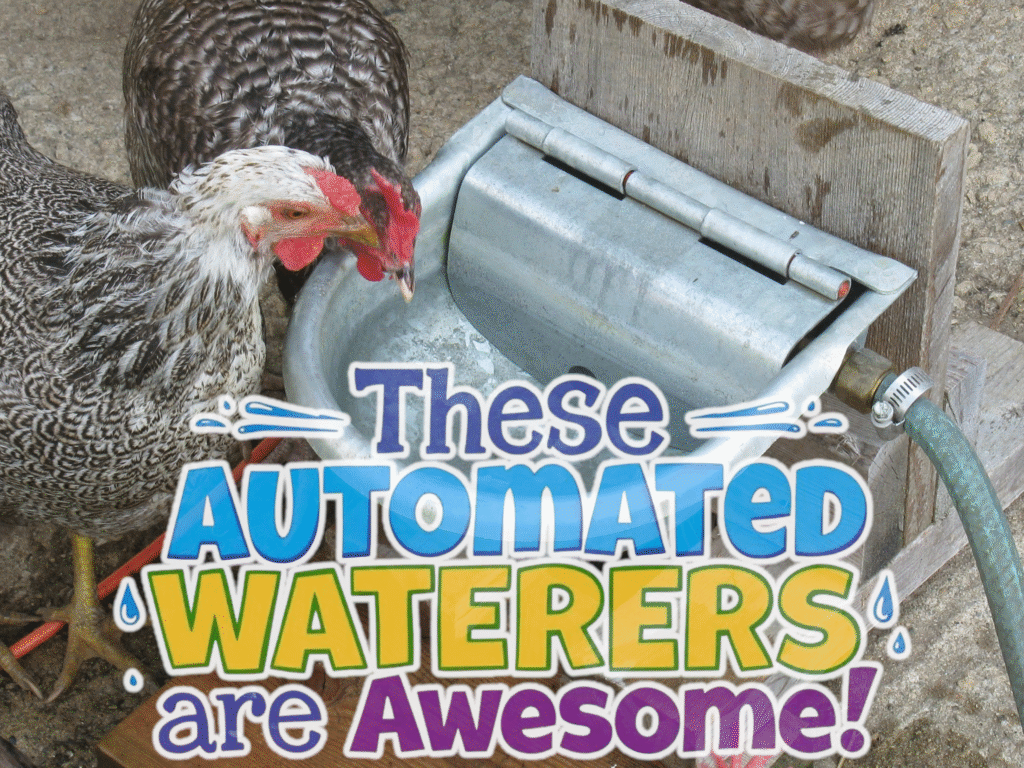The Day My Happiest Hen Went Quiet
I’ve kept chickens long enough to know when something’s off. Years ago, my brightest Buff Orpington—always first to greet me and last to leave the garden—suddenly stopped singing. She sat on the edge of the run, shoulders hunched, eyes half-closed. Eating less. Foraging less. It wasn’t a dramatic illness. It just felt like a gray cloud settled over her.
That day sent me down a rabbit hole I didn’t expect: can chickens get depressed? The short answer is yes—at least in the way we’d describe low mood, apathy, and stress in animals. While we shouldn’t project human emotions onto birds too literally, I’ve seen plenty of hens and roosters perk up—or spiral down—based on environment, health, and flock dynamics.
What follows is what decades with chickens—and a lot of trial, error, and gentle observation—have taught me about helping a “down” flock bounce back.
Can Chickens Get Depressed? What My Flock Has Taught Me
If you’re wondering “can chickens get depressed,” you’re not alone. I’ve asked it too when a normally curious hen starts hiding, or a rooster loses interest in his morning patrol. Chickens absolutely experience stress and behavior changes that look like depression: withdrawal, reduced appetite, less preening, even a drop in egg production.
In my experience, low mood is rarely just one thing. It’s usually a pile-up of small stressors—crowding, parasites, boredom, poor water quality, lack of daylight, and social tension. When I address those, I see each bird wake up again. So while we might debate the term “depression,” the practical answer is this: if we remove the causes and meet their needs, they brighten.
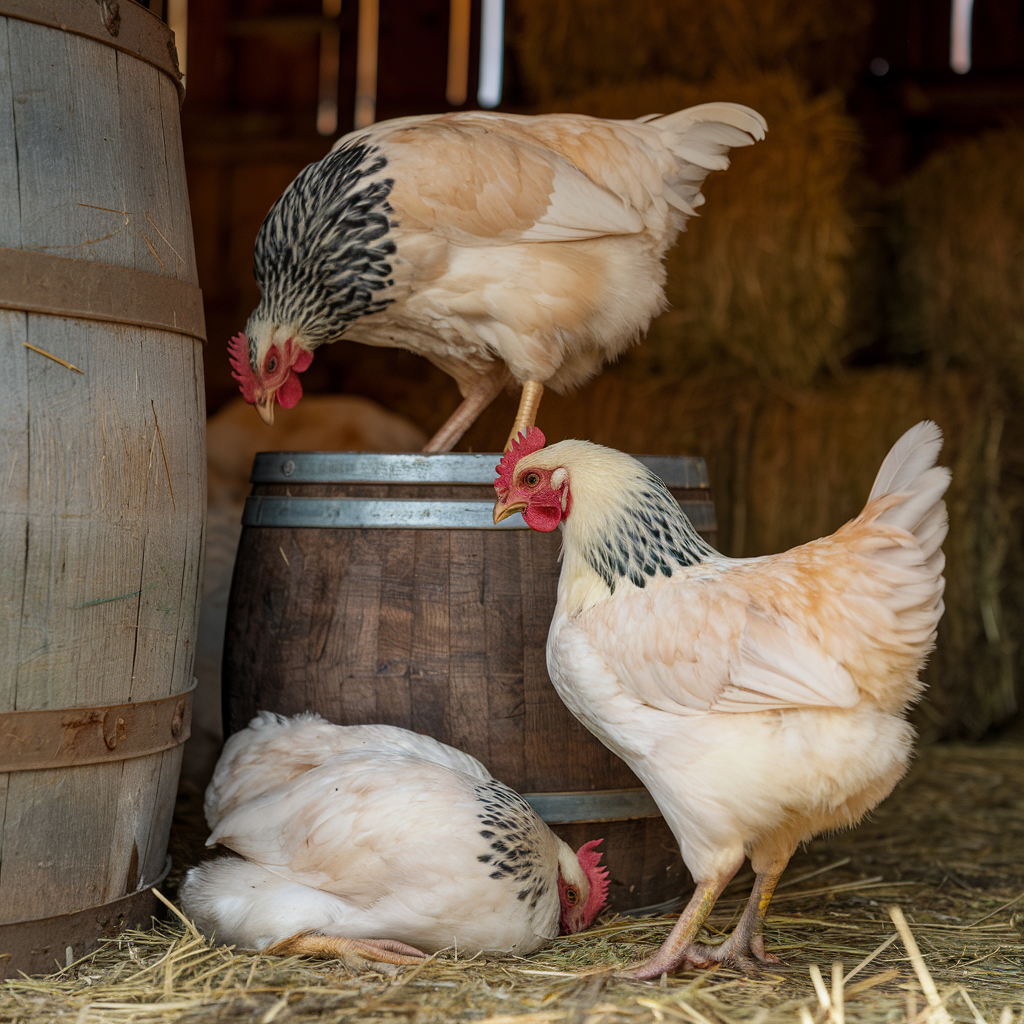
Signs Your Chicken Might Be Depressed or Stressed
These are the subtle (and not-so-subtle) hints I watch for:
- Lethargy, sitting alone, or avoiding the flock
- Reduced foraging, dust-bathing, or preening
- Change in posture: hunched shoulders, tucked neck, droopy tail
- Less interest in treats or a noticeable appetite drop
- Softer clucks, fewer vocalizations, or unusual silence
- Decreased egg production or odd egg shells
- Feather picking (self or by others), or sudden bullying
- Comb changes: pale, dry, or floppy with low energy
- Staying on the roost during the day or hiding in corners
If egg production has dropped alongside mood, I cross-check their diet, daylight, and stress levels. Here are two helpful guides I lean on: why your chickens stopped laying and what you can do and why aren’t my chickens laying eggs and how to fix it. Both connect the dots between stress and laying slumps.
The Common Causes That Drag a Flock’s Mood Down
1) Boredom and Confinement
Chickens are built to move. If they can’t scratch, peck, explore, and problem-solve, their spirits sag. Overcrowded coops and bare runs are mood-killers. Rotating a small yard space, adding perches, tossing a flake of straw to scratch apart, or hanging a cabbage can transform the vibe.
2) Social Stress and Pecking Order
Introducing new birds, a bossy hen, or a restless rooster can rattle everyone. Add nighttime noise and disruption and your flock will show it. If you’re dealing with a boisterous boy, this piece is a sanity-saver: why roosters crow at night and how to calm them down.
3) Parasites and Hidden Health Issues
External parasites (mites, lice) and internal worms can make a chicken miserable. A “depressed” posture may be a bird just trying to conserve energy. I’ve been through it, and this guide was the turning point for my flock: how to treat mites in chickens—the real fix that saved my flock.
4) Nutrition Gaps: Protein, Grit, and Calcium
Chickens need balanced layers feed, plus grit to grind food and calcium for strong shells. Shortfalls lead to thin shells, egg pain, and cranky moods. If you’re unsure about minerals, this explainer is gold: chicken grit vs. oyster shell—what’s the difference and do you need both?. For laying flocks, I’ve seen fast results with a boost: this calcium boost gave me stronger eggs in a week.
5) Water Quality and Hydration
Stale, green water isn’t just gross—it suppresses intake, and dehydrated birds look lethargic. I rotate and shade waterers and use a system that’s easy to keep clean. If algae keeps winning, these resources have helped me keep water fresh:
- how to stop algae in chicken water the easy, natural way
- can I use copper in my chickens’ water to stop algae?
- the auto waterer for chickens I wish I’d bought sooner
6) Seasonal Slumps: Short Days and Cold Snaps
Winter moods are real. Less daylight means less foraging and less laying. I don’t overheat coops—ventilation matters more—but I do reduce stress by blocking drafts and ensuring liquid water 24/7. If you’re navigating winter, these pieces are worth a read:
- do chickens need heat in the winter?
- how to keep chickens warm in winter without electricity
- the heated water bowl that saves my chickens every winter
7) Egg Issues and Nesting Problems
Soft shells can hurt. Broken eggs invite pecking. Nesting stress spirals quickly into bad habits and foul moods. If you’re struggling, this is the straight talk I wish I’d had sooner: why chickens eat their own eggs and how I finally stopped it. And for nest-site sanity, I swear by this setup: the nesting box setup that finally ended the egg hunt.
8) Predator Pressure
Dogs barking at the fence, hawks circling, or a recent coop intrusion can shake a flock to the core. After a scare, I keep routines calm and predictable and add extra cover and roost options so birds feel safe.
Practical Steps to Lift Their Spirits
When folks ask me “can chickens get depressed, and what do I do about it,” this is the plan I share. It’s simple, and it works:
- Space and flow: Give a minimum of 4 square feet per bird in the coop and 10+ in the run. Add multiple feeders/waterers so timid birds can eat in peace.
- Curiosity breaks: Hang a cabbage, toss scratch into a pile of fall leaves, tuck mealworms under a flat rock, rotate perches. Little mysteries wake them up.
- Foraging time: Even supervised yard time helps. If you can manage it, free-ranging chickens can cut feed costs by up to 50% and the mental benefits are enormous.
- Dust bath bar: Offer a low bin with dry soil, sand, and a scoop of wood ash. It’s spa day and parasite prevention in one.
- Nesting zen: Keep boxes darkish, clean, and at hen height. If you’re fighting misplaced eggs or box messes, this helped me: how to stop chickens from pooping in nesting boxes.
- Nourish well: Stick with a quality complete feed. Offer free-choice grit and a separate dish of oyster shell. If you’re unsure which grit to buy, see the best chicken grit for adult laying hens and this primer on why grit is non-negotiable.
- Water wins: Shade your waterers and clean them often. To keep slime at bay, I follow this guide on how to stop algae in chicken water naturally and rely on an automatic waterer that’s easy to maintain.
- Winter comfort: Focus on ventilation, dry bedding, and liquid water rather than excessive heat. I lean on these no-electricity winter tips.
- Parasite patrol: Schedule regular checks and be decisive with treatment. Start here if you suspect mites: the real fix that saved my flock.
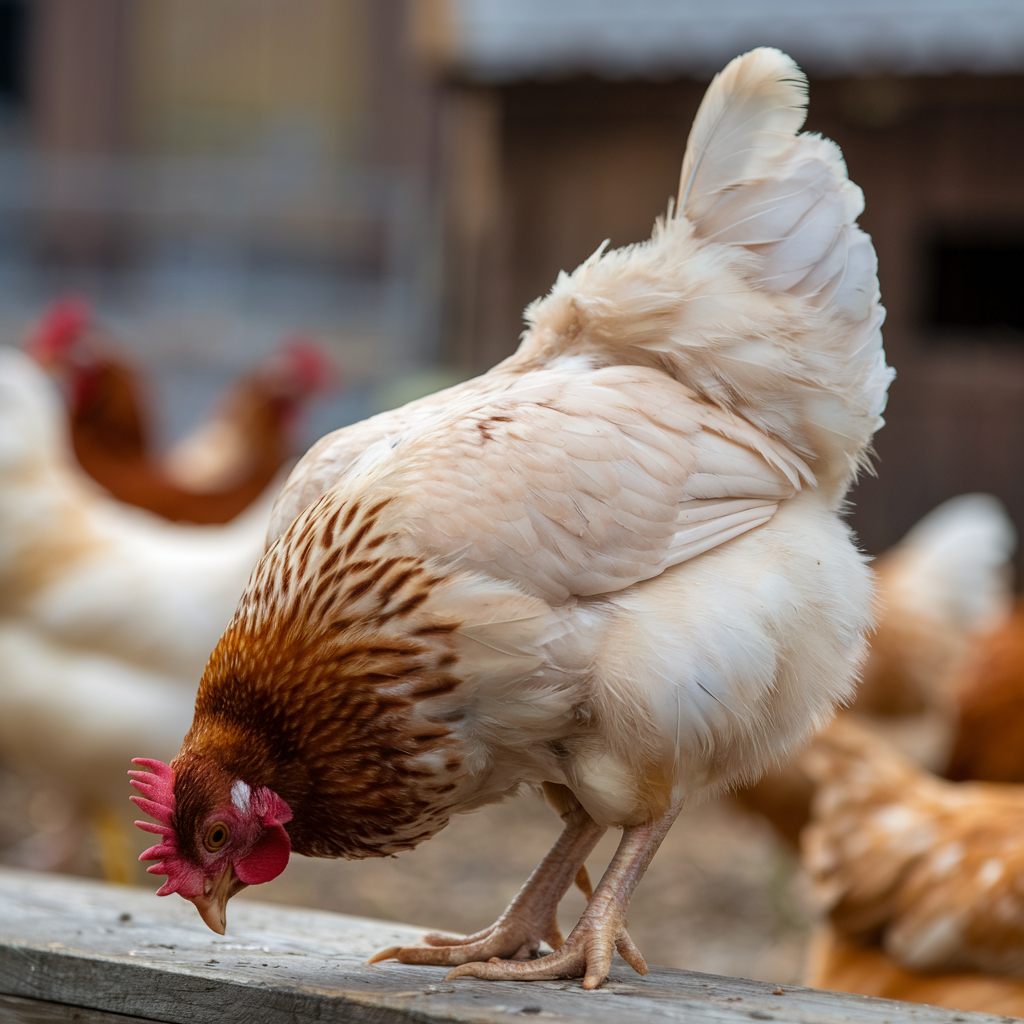
My Weekly Mood-and-Health Checklist
Here’s the quick circuit I walk every week. It’s amazing how much “depression” lifts when these boxes are checked.
- Water: Clear, clean, and cool? Any algae starting?
- Feed: Fresh crumble/pellets available? Grit and oyster shell topped up?
- Environment: Enough roost space? Any bottlenecks near doors or feeders?
- Behavior: Is everyone foraging, dust-bathing, and preening?
- Eggs: Shell quality steady? Any hidden clutches?
- Bodies: Check weight by hand, look under wings for mites, inspect comb color.
- Poop: Normal consistency? Diarrhea or worms?
- Predators: Any dig marks around the run? Fresh tracks?
Can Chickens Get Depressed During Molt or When They Stop Laying?
Short days, molt, and life changes can certainly make it look that way. Molting hens direct energy into feathers, not eggs or charm offensives. They act grumpy, move less, and want quiet. That’s normal. I boost protein a bit, reduce handling, and keep the routine steady.
For younger flocks, timing matters too: when do chickens start laying eggs? Understanding those milestones helps you separate a true mood dip from a natural life stage. If laying stops unexpectedly, I troubleshoot with this step-by-step laying guide before assuming sadness is the cause.
Water, Light, and Routine: The “Big Three” Mood Lifters
When folks ask me “can chickens get depressed” and want one simple fix, I tell them to start here:
- Water they love to drink: Clean, shaded, easy-access waterers. If it’s freezing, I use a heated water bowl that’s saved my flock every winter.
- Predictable daylight: Keep wake-up and bedtime consistent. Add safe enrichment at dawn and dusk.
- Calm routines: Feed in the same places, use the same voice cues, and avoid big surprises—especially with skittish birds.
What Not to Do
- Don’t blast the coop with heat. It risks fire, builds humidity, and can make birds sick when power fails.
- Don’t over-treat with snacks. Too many treats crowd out nutrition and worsen mood and laying.
- Don’t isolate a quiet bird without cause. Separation can make loneliness—and “depressed” behavior—worse, unless you’re treating illness or injury.
- Don’t leave waterers green. Algae puts birds off drinking, and dehydration mimics depression.
- Don’t introduce new birds without a plan. Slow introductions save everyone’s sanity.
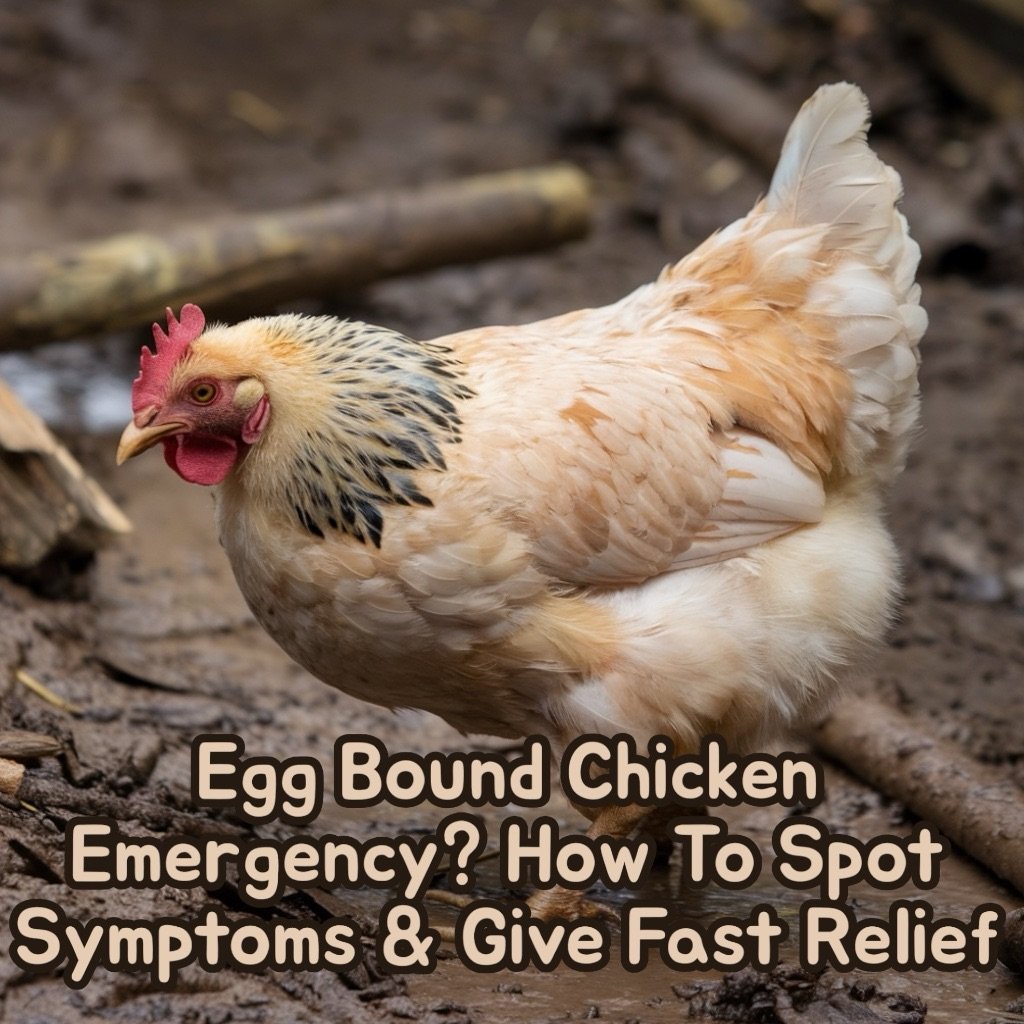
FAQs: Quick Answers From My Coop
Can chickens get depressed if they’re alone?
Yes. Chickens are social. A single bird will often mope, pace, or call. If you lose a hen, consider a companion as soon as practical.
How long does it take a stressed flock to bounce back?
Once the root cause is fixed—parasites treated, space improved, fresh water supplied—you might see brighter behavior in 2–7 days. Egg production takes longer to normalize.
Can roosters get depressed?
They can show low energy and apathy when bullied, bored, or ill. They also react to nighttime disturbances. If yours is restless after dark, see how to calm a rooster that crows at night.
Do treats help lift their mood?
A little goes a long way. I love using bugs as an enrichment tool—just be smart about it. Read this before you go big on grubs: feeding mealworms to chickens: the benefits and the warnings. If you need a convenient source, here’s a handy roundup of mealworms for chickens on Amazon.
Is “can chickens get depressed” just another way of saying sick?
Not always. Mood dips can come from boredom or social stress. But always rule out illness first—especially parasites, dehydration, and nutritional gaps.
Case Study: Turning Around a Low-Spirited Flock
I once took in five hens from a cramped, muddy run. They ate, but rarely foraged, and their eyes looked dull. Within three days of:
- Deep-cleaning their waterers and setting up an automatic waterer,
- Offering a separate dish of oyster shell (this calcium boost method), and
- Letting them scratch a new patch of yard each afternoon,
their demeanor changed. They clucked more, dust-bathed, and one even did that funny sideways hop when she found a beetle. Can chickens get depressed? That flock taught me they can certainly seem that way—and they can absolutely rebound when we meet their real needs.
When to Call a Vet
Don’t wait on professional help if you see:
- Severe lethargy or a hunched, puffed-up posture for more than 24–48 hours
- Labored breathing, nasal discharge, or persistent sneezing
- Watery green diarrhea or blood in droppings
- Rapid weight loss or refusal to eat/drink
- Sudden lameness or neurological signs
“Depression” can be the visible tip of an illness. Trust your gut. Earlier is easier.
Can Chickens Get Depressed? The Gentle, Honest Summary
In my experience, yes—chickens can fall into a low-energy, low-curiosity pattern that looks a lot like depression. But it’s rarely mysterious. If you give them clean water, a balanced diet with grit and oyster shell, good space, interesting terrain, and a calm routine, they bloom. If there’s a health issue lurking, tackle it head-on.
Start small. Freshen the water. Enrich the run. Offer a quiet nesting corner. If algae haunts your waterers, here’s a how-to that made my life easier: stop algae in chicken water the natural way. And if winter is wearing on everyone, skim these practical ideas for keeping chickens warm without electricity. Even a few tweaks can turn a gloomy flock into a curious, content one again.
Take heart. Your birds are incredibly resilient. With a little attention to their world, they’ll tell you—loudly and joyfully—when you’ve gotten it right.
As an Amazon Associate we earn from qualifying purchases through some links in our articles.

